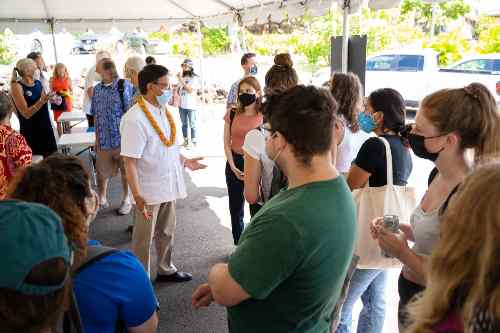
Cara Gutierrez doesn’t just want to learn about leaders in the green movement. She wants to be one.
The senior at Chaminade, who is majoring in Communication with a minor in Environmental Studies, is passionate about helping build a more sustainable Hawaii and has gotten involved in a number of projects on and off campus designed to do just that—from food waste audits to composting.
“I’m just trying to make an impact,” Gutierrez said.
And along the way, she’s hoping to inspire others to do the same.
Gutierrez, who transferred to Chaminade from St. Mary’s College in California as a sophomore, has created a Campus Sustainability Council Club at the university in addition to serving as vice president of the Surfrider Club and a resource recovery specialist at Windward Zero Waste School Hui.
She said her community service efforts grew out of an Environmental Ethics course at Chaminade, where she learned just how important a single person can be in making a positive difference. “I really felt called to help and did different types of volunteering. I wanted to do my part,” she said.

So she started in her own backyard—by looking at sustainability at Chaminade.
In addition to launching her new club, she also conducted a food waste audit at the university to determine how much is thrown away that could instead be redirected to productive composting. That work led her to connect with the agricultural director at Saint Louis School for an innovative zero-waste project now underway and he in turn connected her with the Windward Zero Waste School Hui.
Gutierrez said she when she first reached out to the hui, which works with five public schools to turn their food waste into composted nutrient-rich soil, the director warned her the work wasn’t glamorous. She would be gathering food waste into huge compost piles, the hui told her, turning and watering them as worms break up the organic materials, and then selling that rich compost to the community.
“She told me, ‘This is really hard work. You’ll have dirt everywhere,’” Gutierrez said.
After working for a day, Gutierrez was hooked. “I said, ‘OK, sign me up!’”
If her volunteering and work with the hui wasn’t enough, Gutierrez is also an intern focused on sustainability projects at Chaminade’s new CIFAL Honolulu Centre, part of the United Nations Institute for Training and Research. She said through CIFAL and her sustainability club, she’s planning an educational Earth Day event and a gathering on Oahu’s North Shore to promote agriculture.
With all the hats she wears, Guteirrez doesn’t have much downtime.

But that’s OK. What she has instead, she said, is a community that believes in her—and her mission.
“Climate change is so important and our generation has a responsibility to act. I’m only here for a limited number of years and I want to leave the lightest footprint possible but also have an impact on younger generations,” she said. “Everything I do is for the people who came before and after me.”
She added that her CIFAL Honolulu internship has also helped her zoom out and think about the value of sustainability policy and climate change work at the international level. “In the future, I would be really interested in working toward those bigger goals to make a greater positive difference,” she said.
For now, though, she’s focused on her grassroots work—and on graduation just around the corner. She said she plans to pursue a graduate degree, but will first take a year off to travel. “I’ve learned so much in Hawaii,” she said. “Now I want to go to different communities to learn even more.”







